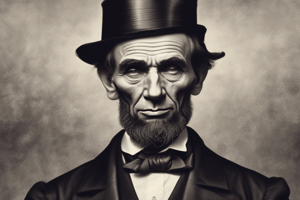Podcast
Questions and Answers
What did Lincoln compare the Constitution to when dealing with slavery?
What did Lincoln compare the Constitution to when dealing with slavery?
- A picture
- A woven fabric
- A declaration
- A frame (correct)
In the 1830s, what did Lincoln propose to abolish?
In the 1830s, what did Lincoln propose to abolish?
- The Fugitive Slave Law
- Slavery in the Southern states
- Slavery in Washington DC (correct)
- The importation of slaves
What was Lincoln's public stance on slavery in the 1850s?
What was Lincoln's public stance on slavery in the 1850s?
- He publicly denounced slavery (correct)
- He believed in the gradual abolition of slavery over time
- He remained silent on the issue of slavery
- He supported the expansion of slavery to new territories
What did Lincoln express in a letter to New York Tribune publisher Greeley?
What did Lincoln express in a letter to New York Tribune publisher Greeley?
What was the significance of General Fremont's decision to free any slaves belonging to Confederate supporters?
What was the significance of General Fremont's decision to free any slaves belonging to Confederate supporters?
What role did the Battle of Antietam play in the emancipation of slaves?
What role did the Battle of Antietam play in the emancipation of slaves?
What was the primary reason for Lincoln's initial hesitation in abolishing slavery according to the given text?
What was the primary reason for Lincoln's initial hesitation in abolishing slavery according to the given text?
What was the significance of Lincoln's decision to frame the Emancipation Proclamation as a military strategy?
What was the significance of Lincoln's decision to frame the Emancipation Proclamation as a military strategy?
What was Senator Charles Sumner's proposal regarding the emancipation of slaves in areas 'in a state of rebellion'?
What was Senator Charles Sumner's proposal regarding the emancipation of slaves in areas 'in a state of rebellion'?
Why did Lincoln delay signing the Emancipation Proclamation until after the Battle of Antietam?
Why did Lincoln delay signing the Emancipation Proclamation until after the Battle of Antietam?
How did Union soldiers' experiences with slaves influence their attitudes towards slavery?
How did Union soldiers' experiences with slaves influence their attitudes towards slavery?
What was Attorney General Bates' interpretation of the Dred Scott decision regarding black people?
What was Attorney General Bates' interpretation of the Dred Scott decision regarding black people?
What strategy did Lincoln employ in delaying initial emancipation in Confederate-controlled areas?
What strategy did Lincoln employ in delaying initial emancipation in Confederate-controlled areas?
Why did Congress take measures to declare any escaped slave reaching the Union army as free forever?
Why did Congress take measures to declare any escaped slave reaching the Union army as free forever?
Flashcards are hidden until you start studying
Study Notes
Lincoln's Stance on Slavery
- Lincoln compared the Constitution to a sheet of paper that protects both the wolf and the lamb, highlighting the contradiction between the Constitution and slavery.
Early Proposals
- In the 1830s, Lincoln proposed to abolish slavery in the District of Columbia.
Public Stance in the 1850s
- Lincoln publicly stated that he was not in favor of abolishing slavery in the states where it already existed.
Letter to Greeley
- Lincoln expressed in a letter to New York Tribune publisher Greeley that his primary goal was to save the Union, not to abolish slavery.
General Fremont's Decision
- General Fremont's decision to free any slaves belonging to Confederate supporters was significant because it was the first attempt by the Union to emancipate slaves during the Civil War.
The Battle of Antietam
- The Battle of Antietam played a crucial role in the emancipation of slaves as it provided Lincoln with a Union victory to justify issuing the Emancipation Proclamation.
Initial Hesitation
- Lincoln's initial hesitation in abolishing slavery was due to his concern that border states would secede from the Union if he abolished slavery.
Emancipation Proclamation
- Lincoln's decision to frame the Emancipation Proclamation as a military strategy was significant because it allowed him to justify the emancipation of slaves as a necessary war measure.
Senator Charles Sumner's Proposal
- Senator Charles Sumner proposed that all slaves in areas 'in a state of rebellion' should be emancipated.
Delaying the Emancipation Proclamation
- Lincoln delayed signing the Emancipation Proclamation until after the Battle of Antietam to ensure that it would not be seen as a desperate measure by the Union.
Union Soldiers' Attitudes
- Union soldiers' experiences with slaves during the war influenced their attitudes towards slavery, leading many to become abolitionists.
Attorney General Bates' Interpretation
- Attorney General Bates interpreted the Dred Scott decision to mean that black people were not citizens and had no rights under the Constitution.
Delaying Emancipation in Confederate-Controlled Areas
- Lincoln employed a strategy of delaying initial emancipation in Confederate-controlled areas to avoid alienating border states and to prevent slave rebellions.
Congressional Measures
- Congress took measures to declare any escaped slave reaching the Union army as free forever, providing a legal framework for the emancipation of slaves.
Studying That Suits You
Use AI to generate personalized quizzes and flashcards to suit your learning preferences.




